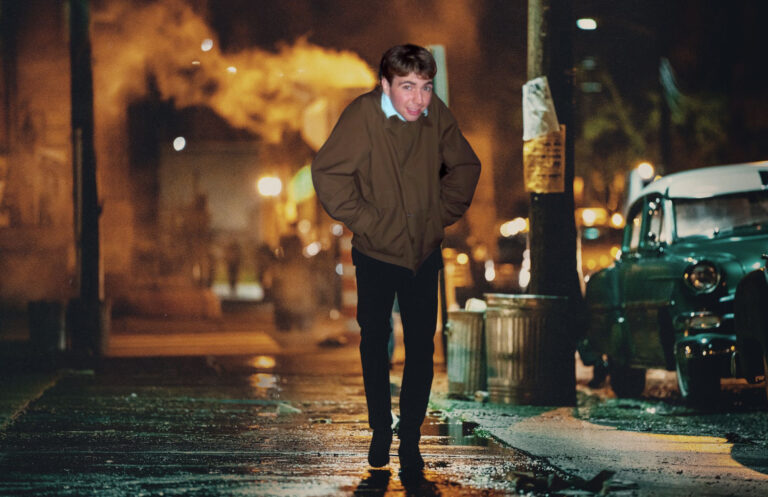By Max Cohen
Everybody, even the people who hate him, pretty much agrees that Bob Dylan is the greatest songwriter of all time. Some will attach asterisks to the moniker (*living/rock/American/white/male) but it’s a waste of time. Fundamentally, Dylan expanded the scope of what a pop song could be, demolished cutesy lyrical boundaries, pioneered genre bending sounds and changed the way record companies thought about artists to the point where his impact is so ubiquitous it’s hard to separate him from the evolution of music. And he did it all in like three years. Dylan’s catalogue isn’t only winners, in fact lots of it is bad, but his best work is so monumental, and driven by an irrepressible fuck-you-attitude, that it makes most other music feel small by comparison.
This is the impression director James Mangold wants you to walk away from A Complete Unknown with—Dylan’s the GOAT and a dick, maybe one causes the other. To show this, Mangold gives him the Zuckerberg treatment, burdening a twenty year old character with the heavy weight of responsibility and a scorn for his unceasing, isolating talent. There’s a scene where Dylan literally calls himself God and it’s only half played for laughs. All accounts suggest the real man was sillier and more affable at the time, but it’s possible this characterization was influenced by the gloomier current-day Dylan who was closely involved in shaping the film’s script.
But Mangold’s demuring to Dylan means the film is too gentle on him. Instead of interrogating his past or writing process, the movie follows the conventional wisdom of show don’t tell. The runtime is choked with performances where other legendary musicians simply stare at him awestruck. You’re supposed to be so overwhelmed by his genius you don’t care that you know next to nothing about him. But great songs don’t add up to a character study. The protagonist is a slippery poet with no backstory or underlying motivation besides being a contrarian. And that’s sort of the real-life Dylan’s superpower—60+ years in the public eye and several documentaries later, we still can’t pin him down. That mystique makes for a great rock star, but not a particularly compelling movie.
Timothee Chalamet undertakes a tricky role because Dylan (a) has been endlessly impersonated and (b) isn’t particularly likeable in the film. Chalamet delivers, down to the jittery little mannerisms, getting about as close as possible without being hokey and still managing to bring some lightness to the part. There’s so many electric moments where you lose the Hollywood wonderkid completely, like when he’s growling digs at Joan Baez in his underwear or schmoozing at a record label party hidden behind dark sunglasses, uncomfortably shifting his weight between his feet.
And Chalamet can really sing, a strong selling point for would-be viewers on the edge. Before A Complete Unknown, my mom hated Dylan’s voice so much that a song of his popping up on the radio warranted an immediate channel change. But she loved Wonka which convinced her to see this movie with me. She’s since found a new appreciation for the music. To prepare for this piece I was watching old acoustic Dylan sets in the kitchen and my mom, who once would have fled the room, instead came closer to watch over my shoulder, tapping her foot and humming along. That’s a tremendous shift in opinion spurred by Chalamet’s endearing performance. Ultimately, the film’s target audience are people like her who don’t really know Dylan. They can get lost in the onslaught of songs without being stuck on what the movie invents (two Black characters who are given less than ten minutes of screentime combined) or omits (Dylan never touches a drug).
But in trying to tell a more accessible story, the film misses how critical Dylan’s bad singing is to his appeal. The rougher parts of his music, the loose rhythms and blaring harmonica, have always been the most compelling. In particular, his garbled, nasally voice is key because it grounds his magnetic persona with a level of humanity. Dylan’s an elusive trickster but when he drops the act to croak out a melody, vulnerable and earnest, you know he bleeds just like you. That’s the real reason he captured the public’s attention, and why his music endures beyond the endless covers. The mix of his beautiful writing and his flawed delivery; the way he tried to shroud himself in mystery but couldn’t escape his own imperfect voice.
Ultimately the choice to lean on Chalamet’s musical theatre chops is the right one, him doing any more of a vocal effect would be grating. But the script never mentions how critics originally dismissed Dylan’s singing. This doesn’t just gloss over part of his allure, it weakens the character’s tension with Joan Baez. It wasn’t just that Dylan was a jerk, a huge reason the pair flipped between admiring and hating each other is they both wanted what the other had. Dylan was a great writer marred by a shoddy voice, while Baez was a tremendous soprano stuck doing covers. A Complete Unknown toys with these ideas but rushes past them, robbing their relationship of a level of depth.
Speaking of missing depth, Sylvie Russo, the stand-in for Dylan’s then girlfriend, Suze Rotolo, is flat and awful. Firstly, I don’t understand why Dylan asked to have her name changed. Everyone knows who she’s supposed to be and people from the film have made it clear she’s a one-to-one of his actual partner. If Dylan really wanted to protect Suze, he should have made sure her character had enough screen time—Sylvie is so underwritten she might as well not be in the movie. After her and Dylan’s cute enough first date, the pair quietly and immediately move in together, have a fight for no real reason, then break up off screen. By the second half we know so little about her there’s no meaningful impact when the couple part for good. Beyond inspiring love songs like “Don’t Look Twice, It’s Alright,” the actual Rotolo was raised by communists and helped expand Dylan’s political worldview. Again, this sort of important character stuff is gestured to, but in too hollow and sparse a way. Elle Fanning who plays Russo is fine, if a little stiff, but there’s only so much she can do with a role that feels more like set dressing. On the other side of the love triangle, Monica Barbaro isn’t necessarily a spot on Baez but her lingering chemistry with Chalamet is so strong it makes even ridiculous moments like the Cuban Missile Crisis scene work.
While the romance is largely a miss, the film partly redeems itself in its depiction of the infamous 1965 Newport Folk Festival performance. The story of that set is always told as a righteous act of rebellion where Dylan became a legendary proto-punk goliath. His attitude and lyrical cred changed rock music forever and all he had to do was show up and play it loud. Unlike all of the other musical scenes, A Complete Unknown doesn’t glorify Dylan going electric and instead deftly frames it as a tragedy.
The sequence is given real stakes because for once Dylan’s detractors aren’t made out to be stuck-up wimps. It’s his most steadfast ally, Pete Seeger, who gets closest to deterring Dylan with his heartfelt teaspoon monologue. Edward Norton’s performance as Seeger drips with an earnest generosity. Even here, positioned against our stubborn hero, he makes an exceptionally reasonable argument about the delicate momentum of the folk revival. Dylan’s resulting decision feels like a betrayal instead of a triumph. The exaggerated crowd boos accent the sting—but not for nothing, if the first time I saw Dylan ditch the acoustic was “Maggie’s Farm” I’d probably boo too. What cinches this section is that it closes with Dylan’s hero, Woody Guthrie wasting away in a hospital bed. Guthrie and the sound he championed are both dying. When Dylan goes electric, it doesn’t just sever personal ties with Seeger and Baez, it kills the movement that held him as its savior. This is the film at its strongest, seamlessly redefining an iconic rock moment while deepening our understanding of the main character. We’re finally given a reason for Dylan’s mopiness—his radical independence leaves casualties. But does the stellar last 30 minutes absolve the movie of the rest of its flaws?
Absolutely not. In fact, A Complete Unknown winds up feeling a lot like another okay biopic from this year, Saturday Night. Both are super fun, awkwardly paced rides that sideline the women in the cast, and are too caught up in reverence to offer much nuance to their source material. Once something groundbreaking has been adopted into the mainstream, it’s hard to re-capture what was so special about it in the first place. The difference is that Saturday Night really tries its damndest when Gabriel LaBelle, as Lorne Michaels, expounds about the meaning of the show. A Complete Unknown kind of doesn’t. Even if the film succeeds in offering a new perspective on one of Dylan’s most famous moments, it wastes too much time being a greatest hits compilation and a weak love triangle that it fails to explore beyond his public persona. What more could you expect from a movie the real man signed off on? Dylan’s too slick to completely show himself—the mystery is half the reason people keep coming back.



